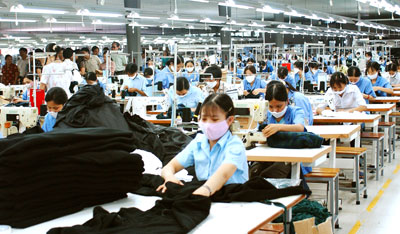TPP lures swarms of garment producers

illustration photo
Northeastern Quang Ninh province’s Department of Planning and Investment said the Trans-Pacific Partnership (TPP), currently under negotiation, was making the province a hot destination for garment and textile firms looking to establish factories as their products are exported to TPP member nations and would enjoy a 0 per cent tax rate on imports.
Under the TPP’s ‘yarn forward’ rule of origin, to be eligible for a 0 per cent import tax rate – instead of the existing 17-20 per cent - all manufacturing processes including yarn spinning, knitting, and dyeing must be carried out in a TPP member country.
The department’s deputy director Do Minh Tuan said Hong Kong’s Black Peony is planning to build a $100 million jeans factory at Hai Yen Industrial Park. TAL Hong Kong Development Company and Sri Lanka’s Hidramani Group were also reportedly working with provincial authorities to build garment factories in Dong Mai Industrial Park.
In the middle of last year, TAL director Roger Lee told Vietnam’s Ministry of Planning and Investment that the company wished to expand its investments in the country by another $200 million due to the benefits it would receive from the TPP. It currently has a $40 million factory established in 2004 making fabrics, garments, and textiles.
In another report, in 2013 Quang Ninh authorities worked with China’s Texhong Textile Group to organize promotion conferences that lured nearly 50 textile and garment firms from Hong Kong and China. They said they plan to continue these efforts in 2014.
In July 2013, Texhong started operating its $200 million first phase fabric plant in Quang Ninh and began construction on its $400 million second phase, to become operational within this year.
Quang Ninh is not the only locality attracting foreign garment and textile firms.
South Korea’s Hyosung, the world’s largest spandex producer announced in late June 2013 that it planned to expand its production facility of its Creora brand spandex in the southern province of Dong Nai.
Hyosung president C.H. Lee Hyosung said this was to better serve the needs of Southeast Asia in anticipation of the approval of the TPP and its yarn forward rule of origin.
In May 2013, South Korean textile and garment maker KyungBang inaugurated a $40 million high-quality cotton yarn factory with 25,920 spindles in the southern province of Binh Duong. When the investment is expanded to its second and third phases, it will be the largest in Asia.
“Once these factories are fully operational, other textile and garment firms will be able to source input materials in Vietnam and meet the yarn forward rule,” said inh Thi Nhu Hoa, a Viet Capital Securities Company senior analyst who recently compiled a report on the TPP’s potential impact on Vietnam’s textile and garment industry.
According to the report, if the rule is carried out, Vietnam would be highly attractive to foreign fibre, cloth, and apparel producers who would build factories to supply the many garment producers already in the country who currently have to import 80 per cent of their materials from non-TPP members China, Taiwan, and South Korea.
At current, Vietnam exports 55 per cent of its garment and textile products to the US, 18 per cent to Europe, and 12 per cent to Japan.
The General Statistics Office reported that Vietnam’s garment and textile export turnover for 2013 hit $17.9 billion, up 18.6 per cent on-year.
The TPP is expected to be signed in 2014 and is a multilateral trade pact of the pacific region with 12 member countries including Australia, Brunei, Canada, Chile, Japan, Malaysia, Mexico, New Zealand, Peru, Singapore, the US, and Vietnam. Once signed, the pact will cover nearly 40 per cent of global gross domestic product.
What the stars mean:
★ Poor ★ ★ Promising ★★★ Good ★★★★ Very good ★★★★★ Exceptional
Latest News
More News
- Hermes joins Long Thanh cargo terminal development (February 04, 2026 | 15:59)
- SCG enhances production and distribution in Vietnam (February 04, 2026 | 08:00)
- UNIVACCO strengthens Asia expansion with Vietnam facility (February 03, 2026 | 08:00)
- Cai Mep Ha Port project wins approval with $1.95bn investment (February 02, 2026 | 16:17)
- Repositioning Vietnam in Asia’s manufacturing race (February 02, 2026 | 16:00)
- Manufacturing growth remains solid in early 2026 (February 02, 2026 | 15:28)
- Navigating venture capital trends across the continent (February 02, 2026 | 14:00)
- Motivations to achieve high growth (February 02, 2026 | 11:00)
- Capacity and regulations among British areas of expertise in IFCs (February 02, 2026 | 09:09)
- Transition underway in German investment across Vietnam (February 02, 2026 | 08:00)
















 Mobile Version
Mobile Version